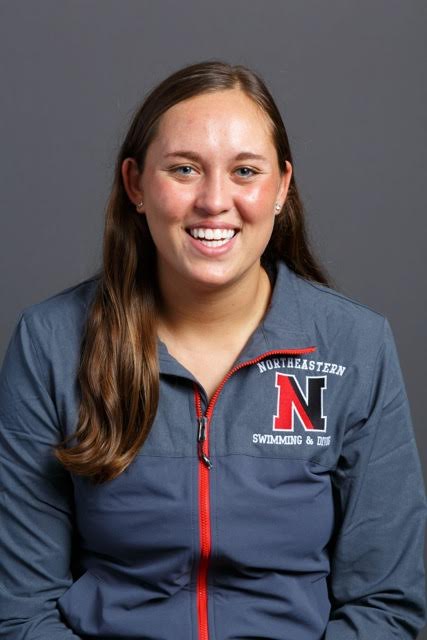I am a fourth-year chemical engineer on the pre-medical track. I am also a student-athlete at Northeastern competing for my final season on the women’s swimming and diving team. The Colonial Athletic Association representatives have asked us athletes to show what it’s like “behind the scenes” of the life of a student-athlete and the challenges and perks that come along with it.
Swimming at Northeastern not only gave me an instant family but also taught me valuable life lessons. The sport showed me the value of working hard and that sacrifices must be made in life. Most people believe that being a student-athlete is a luxurious lifestyle. Yes, student-athletes get to pick their classes first, and yes, we receive nice free gear, but what most students don’t know is that we are constantly pushed past our limits. We are driven to perform at our sport while still excelling in the classroom. We are expected to attend twenty hours of practices a week, compete in meets and host recruits in addition to our classes, exams and group projects. Many people believe that collegiate athletes are here for one sole reason: to play their sport and thrive in that environment. But I am here to thrive in all aspects of life, including the classroom, the engineering community and my co-ops. There is a false stigma about student-athletes that I contradict.
Although being a student-athlete comes with its challenges, I do not regret my choice of becoming a Northeastern swimmer. My advice to incoming student-athletes is this: say no to staying out late because you have an early practice and always stay on top of your homework because your schedule will be very busy, but I promise it will be worth it in the end. You have been given a gift of being incredibly good at a sport — value it. Work hard whether it’s in the classroom or on the field, court or pool.
One of my favorite professors, Barry Satvat, tells the class every day to work hard. He communicates this message to us through every single lecture in one way or another. Through sharing stories of how he became extremely successful or solving a complex engineering problem, he never fails to show us that hard work pays off. This professor has always made time for me if I have questions and has continued to inspire me to pursue my goal of becoming a doctor despite being a chemical engineering major.
In addition to this professor, my co-op adviser has also been valuable. Sometimes it is difficult to get a co-op outside your major and for me, as a chemical engineer who does not want to be an engineer, this is one of the biggest obstacles I have overcome. Instead of giving up, I asked for assistance. My co-op adviser encouraged me to apply to nursing co-ops in order to get patient experience and strengthen my medical school application. I needed this encouragement from my professor and co-op adviser. It is important to work hard and attempt to achieve your goals on your own, but we all need support along the way. Advisers, professors, coaches and co-op supervisors are all able and willing to assist you.
Being a Northeastern Husky has not only allowed me to grow as a student and an athlete, but also as a well-rounded person. The co-op program has given me the opportunity to discover what I love to do and to show the world how hard Northeastern students work. With the help of my coaches, advisers, professors and co-op supervisors I have been pushed to become the best person I can be. I have been driven not toward my goals, but far past them. The journey has been and will continue to be demanding. For new Huskies, always remember to work hard because wherever you are, whether you step out onto the field, walk into the classroom, or begin an interview, you are representing Northeastern University. You are now a Husky and have been given a great opportunity to be a member of this welcoming community. Go Huskies!
From a fellow Husky,
Anila Mehta
Photo courtesy of Anila Mehta.















